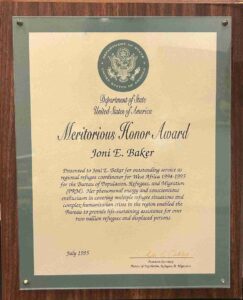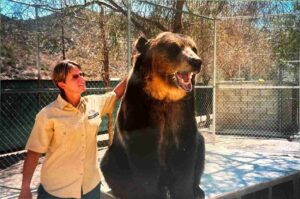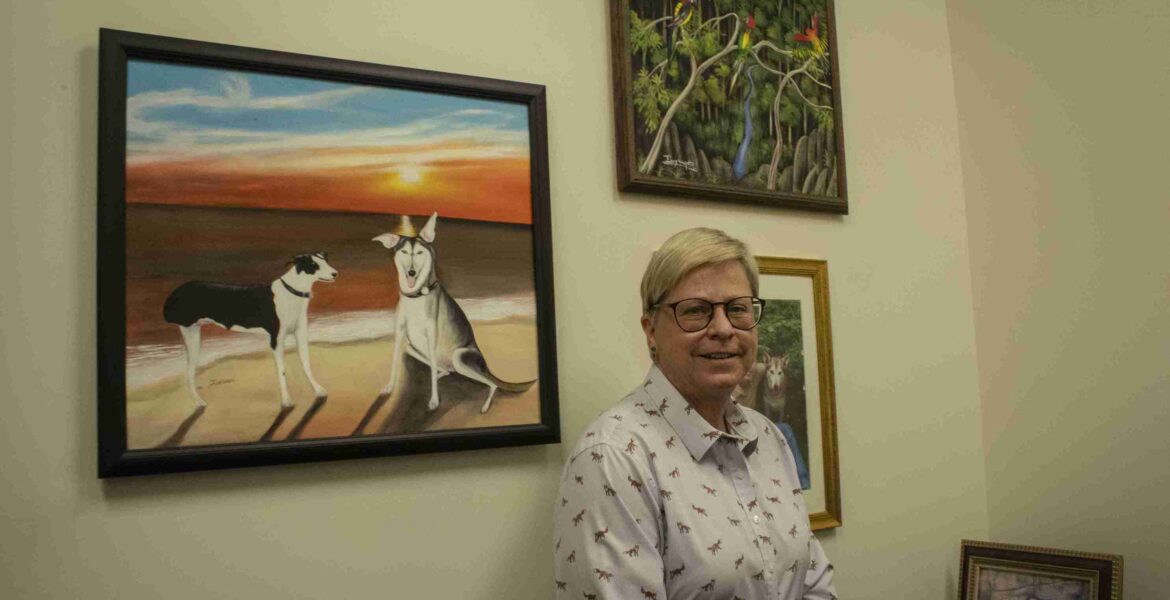As a State Department official, Joni Baker traveled the world representing the U.S. and advocating for people displaced by deforestation and civil unrest.
Today, she advocates for students who encounter any kind of hostile environment, discrimination and stalking based on sex, domestic violence and sexual assault.
After serving as a U.S. diplomat, helping refugees and traveling to around 75 countries to date, Baker is Texas A&M University-San Antonio’s Title IX coordinator for students.
“I grew up in a family of educators and teachers, and they pressed upon me very early on the importance of education, and also the importance of traveling because it expands your mind the more you experience,” Baker said.
Born in Nashville, Tennessee, Baker moved to Washington, D.C., to continue her university education and work for a senator on Capitol Hill. Baker got a Bachelor of Science in political science and urban affairs at The American University. After that, she pursued a Master of Arts in government at Georgetown University.
Her next big step was taking a job as an evaluator at the General Accounting Office in San Francisco.
Three months later Baker would get a call from the U.S. Department of State in Washington, D.C., with news that allowed her to have a lifetime of experiences.
At only 24 years old, Baker became a foreign service officer with the State Department, which she explained is a U.S. diplomat.
“Diplomats are assigned worldwide to embassies and consulates and they have a variety of different functions,” Baker said.
Her first assignment was in Taiwan for 18 months.
“I studied Chinese for six months non-stop,” Baker said as she talked about learning a new language for her first assignment as a diplomat.
After Taiwan, Baker had the rest of her assignments in Africa. Her last one was in Tanzania, one of the 13 countries she covered in western Africa.

Baker’s globetrotting portraits decorate her office. Running along the top shelf are frames with captured memories. In each photo, she is seen posing with a variety of wild animals. Adventurous and carefree energy is brightly radiated from the pictures.
The State Department gave her the Meritorious Honor Award for helping over 2 million refugees and internally displaced people with humanitarian assistance.
“I’m really proud of that. It was a very difficult job,” Baker said.
“It was also very humbling,” Baker said. “The refugees would be in horrible, horrible conditions, but always with a smile on their face.”
Baker said once she asked a few women what they were cooking in a pot by the huts they lived in Guinea. Baker said a woman picked up her spoon from the pot and revealed a frog. The woman was making frog soup, which Baker asked for a bowl to try.

“I thought it was fine, it wasn’t anything I recognized,” she said about the taste of the frog soup that consisted of water, greens, and small frogs.
Baker’s duty as the State Department’s regional refugee coordinator was to report on refugee conditions, security, education, food, water and sanitation. She explained the U.S. government gives money to different organizations to help refugees, and her job was to make sure they were spending it correctly and efficiently.
After being overseas for about 12 years, Baker returned to the United States in 1995 and found her way to Texas A&M University in College Station to pursue a doctorate.
Three years later, between taking classes and giving classes of her own at the Texas A&M campus, she earned a doctorate in natural resources development.
Baker decided to move back to the U.S. due to a family situation. She now has a job that allows her to continue lending a helping hand to people who need it.
Exploring other countries has helped Baker to be more compassionate and approachable.
“Being able to understand other people who are very different from me,” Baker said about how traveling helped her be a good Title IX coordinator.
Baker obtained a job at the Texas A&M System headquarters in College Station doing equal opportunity work for around 20 years before joining Texas A&M University-San Antonio in 2020.
Title IX states no person should be excluded from participating in educational opportunities based on sex, pregnancy, sexual orientation and gender identity.
Baker explained Title IX is a section of a larger law that was passed in 1972. Title IX is a federal law and because A&M-San Antonio and most universities receive federal money like Pell Grants, that means those institutions must abide by the Title IX policy and not discriminate on the basis of sex in any of our education programs or activities.
“Historically, Title IX has been associated with equity and sports because men’s teams would get better uniforms, travel buses, and get more publicity, unlike female teams,” Baker said. “Equitability does not always mean exactly equal, but fairly.”
What does it mean to be a Title IX Coordinator?
“A&M-San Antonio does not enforce Title IX as a law; they enforce it as a policy,” Baker said. “I don’t have any authority. I can’t arrest someone for violating Title IX, but we can take action against someone for violating our non-discrimination policy.”
Jordan Diaz, a compliance investigator at A&M-San Antonio, works alongside Baker for Title IX cases.
Diaz described his first impression of Baker as “very intimidating.”
“I had heard she had a reputation of being very straightforward, very knowledgeable and with high expectations.”
Diaz and Baker first met in the Texas A&M System at College Station, where Diaz had just started his university training as a compliance investigator. Diaz said they communicated primarily through email before he joined Baker at A&M-San Antonio.
After several years of working together, Diaz learned that there was an encouraging person behind Baker’s intimidating persona. Diaz describes his work environment to be very comfortable, adding on how reassuring it is to work alongside his supervisor, Baker.
“We are able to talk about other things that are apart from just work. That’s always nice in a supervisor. It is something you want, not just work, work, work all the time.” Diaz said.

Even though Baker has a busy schedule and an important job, she enjoys some hobbies.
“I do love to travel. Every year I try to go to at least one new country I’ve never been to,” she said.
Baker said her next trip will be to Fiji, an island country in Oceania. She chose that destination because she has never been to the South Pacific before.
“Another reason why I wanted to get in the foreign service was that I wanted to go to Africa to see the wildlife before it all disappears,” Baker said. In the mix of her awards, family portraits and art, she pulled out of her box a few frames with photos of her with a tiger, a lion cub, a rhino, a seal and a baby crocodile.

“I wanna go and see them where they are not in cages,” she said. “That brings me the most pleasure.”
Baker said her favorite part of her job is the tabling events in the courtyard on campus. Interacting with students, talking to them about their academic lives and getting to know them personally allows her to spread information about Title IX.
“When I worked at College Station, I covered all the universities in the system and agencies so I never really interacted one-on-one with the campus community, so it’s wonderful to be here on campus and make those personal connections,” Baker said.
Baker says she thoroughly enjoys helping students. But it also means there is a possibility that someone broke the policy.
“If we have a Title IX violation, it means someone on our campus has been treated badly in one form or another, and I hate to see anyone in our community who has been hurt because of a Title IX violation,” Baker said.
Baker encourages students to reach out to her if anyone feels like they have been discriminated against, harassed, or even if they feel unsure the policy has been broken.
Baker said, generally, her cases are about individuals not communicating clearly what their boundaries are when it comes to friendships, relationships and sexual relationships.
Diaz spoke about his years of working with Baker and his experiences getting to know a side of her that not many people get to see. He described Baker as a valuable resource who even though she might not be directly giving information, she finds a way to point people in the right direction.
“I think the university needs someone with that level of commitment,” he said. “To have a Title IX coordinator who has all that knowledge and is willing to apply it to the students and to the campus.”
Baker had the opportunity to meet Bernice “Bunny” Sandler, also known as the “Godmother of Title IX.”
Sandler was the director of the Project on the Status and Education of Women at the Association of American Colleges and the chair of the National Advisory Council on Women’s Educational Programs. Her hard work was a big push that got the Title IX law passed, Baker said.
Baker shares a story Sandler tells on how up until the ‘70s certain schools would only admit one or two females to different programs if they even allowed females at all. When Sandler was trying to get a faculty job, she couldn’t find anybody to hire her because she was a woman.
Baker also experienced gender discrimination in the 1970s when she was a 16-year-old teenager in Tennessee.
“The first job I ever applied for, when I was in high school, was to be a sacker at a grocery store. They wouldn’t hire me because I was a girl,” Baker said. “Title IX is meaningless to a lot of people unless they understand the reason for the law in the first place.”

Baker, 64, has planned to retire in three years. She does not look forward to her retirement since she’s had a job since she was 14 years old.
Yet she hopes to leave satisfied that the A&M-San Antonio campus will not only continue complying with the laws and policies but also proactively educate others about unacceptable conduct in colleges.
After traveling around the world and learning Mandarin Chinese, Swahili, French and Spanish while in the foreign service. Baker shared one of her favorite quotes.
“You can’t have a narrow mind and a thick passport,” Baker said, quoting Pauline Frommer, co-president of FrommerMedia, editorial director of Frommer’s Guidebooks, and author of the best-selling “Frommer’s EasyGuide to New York City” along with other guides.
Traveling around the world and working in foreign countries with different cultures showed Baker that each person has a variety of customs and limits to their boundaries.
Baker explains there have been instances where people who join campus from other communities think that they can be treated and treat others the only way they have been taught to do so. Her journey has helped her to be more understanding as she now works as the Title IX coordinator.
“If you don’t know what personal boundaries are, please take the time to learn what they are,” Baker said
**********
For more information about Title IX visit U.S. Department of Education.
For more information about Sandler, the “Godmother of Title IX,”, visit National Women’s History Museum.






